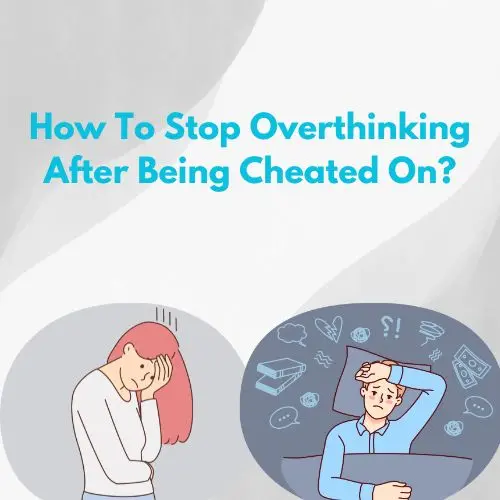Opening Thoughts
You’ll never suffer through anything more devastating than betrayal. Once or betrayed not only shatters trust but also throws into question all that we are sure of and leaves behind an abundance of questions only gone mad could answer.
Feeling such situations out in your mind is just as it should be. Unfortunately, too much thinking of the wrong sort can damage your mental health and postpone recovery from its roots. Here are some working suggestions for avoiding rising mental turmoil after infidelity and emerging more powerful than before.
Types of Overthinking After Betrayal
Understanding the different types of overthinking can help you identify and address your patterns:
| Type of Overthinking | Symptoms | % of People Experiencing It |
|---|---|---|
| Regretting the past | Wishing you could change something you did or said, blaming yourself | 65% |
| Imagining worst-case scenarios | Fearing the relationship will never be the same, dwelling on why they cheated | 55% |
| Over-analyzing details | Obsessing over texts, call logs, or other evidence of betrayal | 45% |
| Fantasizing reconciliation | Hoping they will change, come back, and make things right | 35% |
1. Acknowledge What Happened and Begin to Accept It

The first step to dealing with overthinking is acceptance. Recognize that it happened and acknowledge that it is something beyond your control. Denial, rationalization, or fantasies about a miraculous reconciliation are not going to take away the pain.
It is very tempting to reenact all the details or wonder “why.” However, these actions will not bring you the closure you’re looking for. Instead, whenever you catch yourself spiraling, gently redirect your thoughts to the present moment. Acceptance is not an excuse for their actions-it’s a way of liberating oneself from the burden of things one cannot change.
2. Express Your Emotions Constructively

After a betrayal, it is normal to feel anger, sadness, and confusion. Bottling these emotions can make overthinking worse. Instead, channel them in healthy ways:
- Journaling: Write down your unfiltered emotions to process them.
- Physical Activity: Exercise, dance, or practice yoga to release pent-up tension.
- Talk It Out: Share your feelings with a trusted friend or therapist who can provide perspective and support.
- Creative Outlets: Share your feelings through art, music, or other hobbies that keep you calm.
Suppressing your feelings can bring them back as unwanted thoughts later. Let yourself feel sad and heal by allowing your emotions to flow naturally.
3. Keep Yourself Busy

An idle mind often is the starting point for overthinking. Adjust your focus by remaining active:
- Follow Daily Schedule: Try and adhere to a daily routine as it gives you a feeling of order.
- Try New Interests: Try self-taught activities like cooking, gardening, or painting.
- Get Outside: Walk for long distances, go hiking, or go to quiet scenic spots.
- Volunteer or Interact: Volunteering can help you change your viewpoints and add to your self-worth.
The objective is to learn to manage your feelings rather than running from them, allowing your mind to unwind while also being somewhat productive.
4. Cut Off All Contact
“Out of sight, out of mind” is particularly effective when moving on. Limiting contact with the person who betrayed you can prevent The old saying, ‘Out of sight, out of mind’, rings perfectly true while getting over someone. If you do this, you decrease the chance of an emotional relapse as a result of the person who hurt you. This is how:
- Unfriend/block the person on social media.
- Please stay away from common friends who bother you with their life updates.
- Clear out chat history and pictures to reduce sentimental memories.
Ending up a relationship with someone is not for revenge purposes instead it is to make enough time and distance to think about you and heal.
5. Challenge Negative Thought Patterns

betrayal often triggers a cycle of negative self-talk, such as, “I wasn’t good enough,” or “I’ll never trust anyone again.” These thoughts can erode your self-esteem and perpetuate overthinking. Combat them by:
- Identifying Distortions: Recognize when your thoughts are irrational or overly critical.
- Reframing the Narrative: Replace thoughts like, “It was my fault,” with, “Their actions reflect on them, not me.”
- Accept and Confirm Your Worth: Be proud of your strengths, your values, and what characterizes you as special and lovable.
Positive Self-Talk will help one to feel more confident while better understanding the situation.
6. Forgive Yourself and Let Go of Blame
It’s easy to think about what you “could have done better,” but blaming yourself only makes things worse. Remember:
- You’re human, and therefore, you’re imperfect.
- You put care, love, and effort into the relationship; that’s something to be proud of.
- Their choice in betraying you says a lot more about their character than it says about your worth.
Forgive yourself for any “mistakes” you think you made and give yourself the same kindness you would give a good friend in the same situation.
7. Set New Goals and Find Purpose

Redirect your energy into building a fulfilling future. Setting goals gives you something to look forward to and helps shift your focus from the past. CoPut your energy into creating a happy future. Making goals gives you something to expect and helps you think less about the past. Think about:
- Following a passion or hobby you haven’t worked on.
- Making fitness, career, or personal growth goals.
- Planning new experiences like traveling or helping others.
Reaching small goals raises your confidence and shows you that you can build a meaningful life after being hurt.
8. Seek Professional Support If Needed

Sometimes, self-help methods might not work. If unwanted thoughts keep coming back or affect your daily life, think about getting therapy. A trained counselor can help you:
- Deal with past trauma.
- Create ways to stop overthinking.
- Improve your self-esteem and confidence.
Therapy is a strong way to grow and heal. It shows strength, not weakness, to ask for professional help.
Final Thoughts
Overthinking after cheating is common when feeling hurt, but it should not control the healing journey. It is important to accept what happened, talk about your emotions, stay occupied, and combat negative thoughts to break free from this cycle of overthinking.
Healing takes time and requires patience. Each small step you take counts as progress. Observe your improvement, spend time with supportive friends, and trust that brighter days are ahead. You possess the strength to overcome this difficult period and rediscover your confidence and joy.

